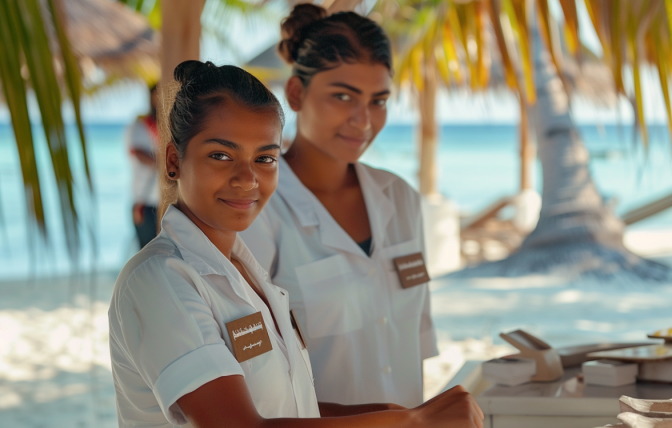


The tourism sector is a cornerstone of the Maldivian economy, providing substantial employment opportunities. However, an analysis of the 2022 employment data from the country’s resorts reveals a stark gender imbalance. Despite the growth of the sector, women remain significantly underrepresented in the workforce, which raises concerns about inclusivity and the barriers women face in accessing employment in this key industry.
Out of the 55,874 individuals employed in resorts across the Maldives in 2022, a staggering 89% were men, with only 11% of the workforce being women. This gender disparity is even more pronounced among Maldivian workers, where just 8% of women were employed in resorts compared to 92% men. This suggests that while the tourism sector is a major employer in the country, its benefits are not equally distributed between men and women, particularly among the local population.
The picture improves slightly when considering foreign workers. Of the foreign workforce employed in resorts, 39% are women, indicating that gender representation is somewhat more balanced among expatriates, though still far from parity. These figures point to deep-rooted structural issues that prevent women from participating more fully in the resort industry.
A closer look at the types of roles available in resorts reveals that the gender disparity is not uniform across all sectors of resort work. Certain roles are particularly male-dominated, contributing significantly to the overall imbalance.
For instance, food and beverage services, which account for 33% of total resort employment, are overwhelmingly staffed by men. In contrast, women are more likely to be employed in accommodation services, which make up 23% of resort jobs. In this area, Maldivians tend to dominate, with 72% of workers in accommodation being local. This suggests that certain sectors of resort work may offer more accessible opportunities for Maldivian women, although these roles are still not enough to balance the broader gender gap.
Additionally, certain high-demand sectors, such as passenger transport, see virtually no female participation, particularly among foreign workers, with 93% of this segment being male. Meanwhile, sectors such as sports, cultural, and recreational activities also show a male bias, with 54% of jobs held by men. These sectoral differences highlight the challenges of achieving gender parity across the resort workforce as a whole.
One of the unique challenges of resort employment in the Maldives is the requirement for workers to live on-site. According to the 2022 data, 91% of resort employees live within the resort premises, while only 9% commute. For women, particularly Maldivian women, this on-site living arrangement presents significant barriers.
Cultural norms and family responsibilities may make it difficult for women to leave their homes and families to live and work in remote resort locations for extended periods. This logistical challenge, combined with societal expectations around women’s roles within families, particularly in more rural areas of the Maldives, could be a key factor in the low participation rate of Maldivian women in resort employment.
Furthermore, the lack of family-friendly facilities at resorts and limited support for working mothers means that few women are able to take advantage of employment opportunities that require on-site living. This imbalance not only limits the potential pool of talent for resorts but also entrenches gender inequality in one of the country’s most important industries.
To reduce this gender disparity, it is essential to address the structural barriers that prevent women from participating more fully in the resort workforce. One solution could be to increase the availability of commuting options for women, allowing them to work in resorts without needing to live on-site. Additionally, providing family-friendly accommodations and support for childcare at resort locations could help attract more female workers, especially Maldivians.
Another important measure would be promoting careers in the tourism industry to young women through targeted education and vocational training programmes. Encouraging women to enter roles traditionally dominated by men, such as food and beverage services or administrative roles, would help create a more balanced workforce. Furthermore, offering more flexible work arrangements could attract women who might otherwise be unable to take up employment in resorts due to familial responsibilities.
The 2022 employment data from Maldivian resorts reveals a stark gender imbalance that must be addressed if the country’s tourism sector is to be truly inclusive. While foreign women participate more actively in resort work, Maldivian women remain significantly underrepresented. This disparity is driven by a combination of cultural, logistical, and structural barriers that need to be overcome.
As the tourism industry continues to grow and contribute significantly to the Maldivian economy, it is crucial to ensure that women have equal access to opportunities within this sector. Addressing the gender disparity will not only improve the inclusivity of the industry but also help fill workforce gaps and contribute to the long-term sustainability of the sector.